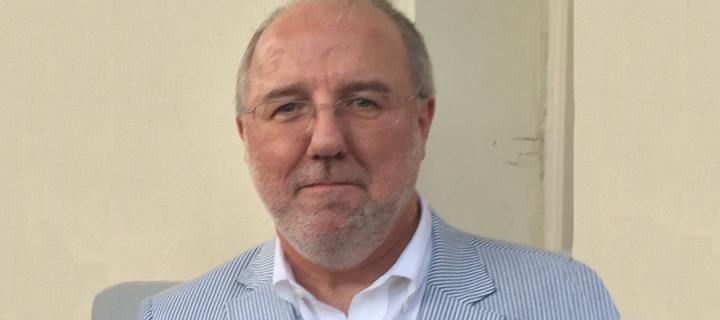John R Walker
John R Walker completed two degrees at Edinburgh before going on to have a fascinating career at the Foreign and Commonwealth Office. He tell us more.
| Name | John R Walker |
| Degree Course | Politics And Modern History; PhD Politics Department |
| Year of Graduation |
1982, 1987 |

Your time at the University
My uncle had been to Edinburgh to study law, and when I was younger that was something that I wanted to do as well. However, I changed my mind about a law degree but stuck with my ambition of coming to Edinburgh where I ended up for both my undergraduate and postgraduate degrees in modern history and politics.
As for summer jobs, I had the same one between the time I left school and into my postgraduate years – a green keeper at the local golf course for about 10 to 12 weeks where we routinely started work at 5.30am and sometimes even earlier at weekends in high summer – not that we really have high summer in Scotland!
I was a member of the University’s Railway Society and we managed to convince British Rail to name one of its class 47 locomotives ‘The University of Edinburgh’ to mark the 400th anniversary of the founding of the University. Much later on when the loco had been withdrawn I had a chance to buy one of the nameplates that was on sale at Collectors’ Corner at Euston station, but I hesitated and the opportunity was gone.
Make the most of your time at Edinburgh – work hard and play hard as that will set you up well for life.
Tell us about your experiences since leaving the University
I was two and a half years into my PhD on British Attitudes to Nuclear Proliferation 1952-1982 when I spotted an advert for a three year senior research officer post in the Foreign and Commonwealth Office’s Arms Control and Disarmament Research Unit – there was a prospect of a further two years, but at that stage I planned to pursue an academic career and thought that a few years’ experience working at the coalface would be ideal and be extremely valuable later for securing a post at a university researching and teaching strategic studies. So I applied without any great expectation.
To my great surprise I was appointed to the FCO post and then spent the first year working evenings and weekends to finish my PhD. The FCO seemed to like me enough to offer a two year extension and then, even better, the post was made a permanent one when I was half way through my fourth year. By this time working in the FCO was always proving much more interesting than going back to academia.
And some 32 years later I’m still there, but now as the Head of the Arms Control and Disarmament Research Unit. Working on the inside on nuclear, chemical and biological weapons arms control has been fascinating, rewarding and at times deeply frustrating – it has been good fun too. Being at the centre of negotiations in Geneva, The Hague and Vienna, drafting and presenting UK national working papers as well as conducting historical research into arms control history and Britain’s own nuclear, biological, chemical weapons programmes has been, and remains, a truly satisfying experience. Despite being a serving FCO official I’ve managed to publish two books on arms control history, which was a career high point: 'British Nuclear Weapons and the Test Ban 1954-1973' and 'Britain and Disarmament: The UK and Nuclear, Biological and Chemical Weapons Arms Control and Programmes 1956-1975'.
But perhaps the most personally challenging events and most significant were my participation in the Comprehensive Nuclear Test Ban Treaty’s major on-site inspection exercises in 2008 at the former Soviet nuclear test site at Semipalatinsk, Kazakhstan, where I played the role of the surrogate inspected state party representative; and in 2014 in the even larger exercise in Jordan where I led the external evaluation team. In Kazakhstan we lived for a month in a tented camp on the edge of the ‘Polygon’ – the Soviet era name for the test site; the weather was unseasonably bad and for a short while it seemed more of a survival than an on-site inspection exercise. Despite that I would not have missed the opportunity and would happily do it all again.
This experience also shows how things can change, which as someone who started off as an historian is good to witness from first-hand experience. When I joined the FCO in March 1985 the Cold War was still under way with no end in sight, the UK did not favour a test ban treaty at that time and any notion that Western experts would have access to the Soviet nuclear test site would have been dismissed as fantasy. Over 20 years later there we were a multinational group of experts camped by the test site making a series of scientific observations and measurements. On the way back from the exercise we spent a few days in the formerly closed city of Kurchatov. As the ‘head’ of the inspected state party team in the exercise our hosts put me up in a dacha that was used by the test directors when the Polygon was active – you couldn’t make it up!
Alumni wisdom
Make the most of your time at Edinburgh – work hard and play hard as that will set you up well for life.
Send us your profile
We are interested in the role that the University has played in your life, either directly – in terms of skills and knowledge – or indirectly, via friends, experiences or chance encounters. Please get in touch and you and your experiences could feature on our website.

